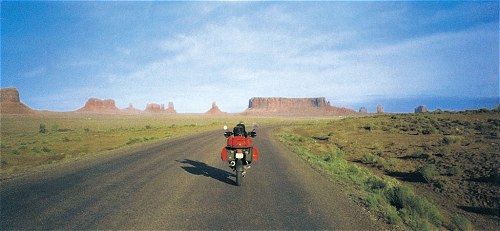
Over the last year or so I’ve been slowing working my way through Neil Peart’s Ghost Rider, his memoir of a motorcycle journey he took after losing his daughter and wife in a single year. Documenting his 55,000-mile ride through Canada, the United States, Mexico and Belize, Neil does a good job of not only communicating the alien feelings experienced within the depths of loss, but the frustration of having to live in this futile, superficial and mostly pathetic world. As such, he does spend a fair amount of time complaining about Americans, but I was sympathetic to how many things are annoying when you’re in the depths of such an experience…
I tried to capture some of the passages that I found myself saying, “Yes! Yes!” to. I know I did not get them all, but Neil kept the straightforwardly introspective words to a minimum and instead allowed the lens of his journeys tell the story of the path through his losses.
…I blithely watched a TV documentary about the Mormon trek west in 1847. It quoted a woman who had survived the ordeal about the terrible hardships they had endured, and the last words I remember were, “The only reason I am alive is because I could not die.” That terrible phrase would come back to haunt me in the months that followed. (7)
Earlier that summer, contemplating the wreckage of my life, I had determined that mission now was to protect a certain essence inside me, a sputtering life force, a meager spirit, as though I held my cupped hands around a guttering candle. In letters I had begun calling that remnant spark “my little baby soul,” and the task before me now, I decided, was to nurture that spirit as well as I could. (14)
Not only have to relive and examine every episode of life with Jackie and Selena, but every single episode of my own life. Every embarrassment, act of foolishness, wrong-headedness, error, idiocy etc. going back to childhood and all the way forward to now…I physically flinch, say “ow” out loud…and can hardly bear it. Such stupid things sometimes, but it seems my confidence, or believe in myself, or something is so shaken, so undermined, so tenuous, that I have no tolerance, no understanding, no forgiveness: for myself or anyone else…Without knowing it, I had identified a subtle but important part of the healing process. There would be no peace for me, no life for me, until I learned to forgive life for what it had done to me, forgive others for still being alive, and eventually, forgive myself for being alive. (39)
In the days following Selena’s death, I had learned…how a sunny day could actually seem dark, the sun totally wrong, and how the world around me, the busy lives of all those oblivious strangers, could seem so futile and unreal–as futile and unreal as what passed for my own life.
If some of the journal notes I have quoted seem ill-tempered, even misanthropic, this attitude should be understood as a kind of envy, which so often has a bitter aftertaste. In the wake of my devastating losses it was hard for me to accept that fate could be so unjust, that other people’s lives should remain unscarred by the kind of evil that had been visited upon me. The big question, “why?” was a ceaseless torment, as my brain struggled for meaning (Is this a punishment? A judgment? A curse?), and when I saw other people with their children, or with their lovers and mates, or even just apparently enjoying life, it wasn’t so much ill will that moved me, as it was jealousy, resentment, and a sense of cruel injustice. (80)
At the end he offers,
Sometimes I can almost sustain the high-minded sentiment that it was worth the pain of losing Jackie and Selena for the joy of having known them. I don’t know if I will ever be able to embrace that notion, but the important thing is that I embrace today…
(I just found the first three chapters online if you are interested in a more in-depth preview.)